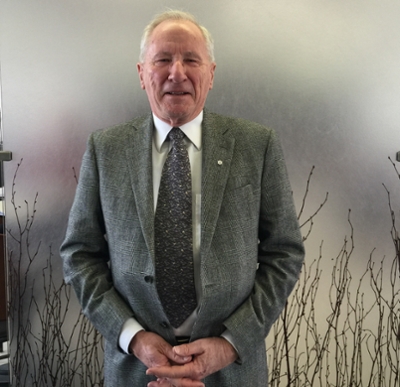
Renowned CoM alum a game-changer in pediatric arthritis research
Dr. Petty recently returned to the CoM and Royal University as a visiting lecturer presenting and teaching sessions to faculty, students, patients and their families.
By Marg SheridanFor a long time pediatric arthritis research was lumped in with the work being done to study and treat the adult version of the disease.
But that decision has proven to be a disservice to both adult and juvenile arthritis patients and researchers alike, said Dr. Ross Petty CM.
“It hasn’t been an easy road,” Petty explained. “Now, in 2015, it’s a given, I think every medical school in Canada (save one) has pediatric rheumatologists, but when I came back to Canada in 1976 there were none – so it’s changing dramatically, but we had to demonstrate we can do something.”
Part of the problem was the common idea that arthritis is a disease of the elderly as opposed to one that can potentially affect anyone.
“Pediatric rheumatology has had to persuade the pediatric departments that we really are useful,” Petty continued. “I think there’s still the perception amongst a lot of people that kids don’t get arthritis, and if they do it’s like the adult disease.
“But kids do get arthritis, and it’s not very much like the adult diseases, so I don’t think we can lean on the adult rheumatologists to provide us with the patient care, or ask them the research questions we ask – we had to do this ourselves.”
Two of the most common forms of adult arthritis, osteoarthritis and rheumatoid arthritis, are not at all common in juveniles, whereas there are several types of juvenile arthritis that aren’t seen in adult patients. The difference, Petty believes, is part of why children’s hospitals play such an important role in treatment.
“Like everything else in research, you have to have enough people with the same interests – both focused and broadly – around you to thrive,” Petty said regarding the role children’s hospitals have to play in juvenile arthritis research. “And you’ve got to have the critical mass of patients to do the clinical research, and you don’t get that easily in a general hospital setting. You can, but it’s tough.”
Petty, who is originally from Paynton, Saskatchewan – a small town located between North Battleford and Lloydminster – graduated from the College of Medicine in 1965 before completing his pediatric studies at the University of Michigan on the advice of a professor.
But before his work in Ann Arbor started, Petty broke his leg in a skiing accident – it was a delay that would force him to take an elective during his first month while he recuperated.
“I figured I’d get the most sympathy then in pediatric rehab,” Petty joked. “And lo and behold, the first patient I saw had juvenile arthritis, and I was absolutely fascinated by this and had great mentors. I realized this was what I wanted to do.”
Now, 50-years following his graduation from the College of Medicine, Petty is recognized among the world’s most eminent pediatric rheumatologists. He established Canada’s first formal pediatric rheumatology patient care, research and teaching program at the University of Manitoba, and since then has trained many of Canada’s and the world’s pediatric rheumatologists.
In 2008 Petty received the Order of Canada in recognition of his work in the field of pediatric rheumatology, this following closely on the heels of earning a Masters Award from the American College of Rheumatology. He’s so well respected in the field that when Canada’s first Pediatric Arthritis Chair was created at the British Columbia Children’s Hospital in 2013, only the second such chair in the world, it was named after him.
Dr. Petty recently returned to the CoM and Royal University as a visiting lecturer presenting and teaching sessions to faculty, students, patients and their families.
